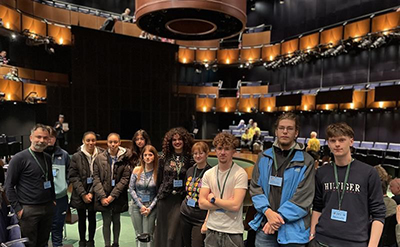Our A-Level Politics students recently took some time away from the classroom to enjoy a trip to Soho Place Theatre in London’s West End to watch ‘Kyoto’, a political thriller based on the Kyoto Protocol of 1997.

Student Sofia recounts the experience:
“The Kyoto Protocol of 1997 had unprecedented effects on international communities and global politics, as explored in the theatre production ‘Kyoto’ at Soho Place. Showing the squabbles over syntax and the conflict between large states and small islands, this play depicts the tense nature of international relations. The stage design forced the audience into engagement and action as they sit levelled with the actors for much of the production; positioned on the same level as the states, sitting on the same round table.
The story follows Don Pearlman, the American lawyer, oil lobbyist and climate-sceptic and his less than savoury view on the Protocol. The darkly humorous tone of the play is on full display from the opening line, but this does not take away from the importance and gravitas of what is being dramatically reenacted.
In a time where the topics of climate change and global warming are more important and dangerous than ever, reflecting on the views of states from 1997 should show how far politics has come in regard to such issues. However, Kyoto is not interested in filling the audience with optimism when it comes to politics’ relationship with climate change. The first act consists mainly of state’s arguing over the adjectives and verbs to be used in the Protocol, what is going to be in whose best interest and, the big one, if climate change is actually real. By the end of the second act when the Protocol is successfully signed, there is hope that something could be done about climate change by the world’s leading politicians. But, as the play’s final monologue states, the cherry blossoms fall earlier every year in Kyoto and there is still more to be done by states and their politicians in regard to climate change. It was an entertaining, surprisingly humorous piece of theatre, very relevant to our course and the wider political landscape.”
